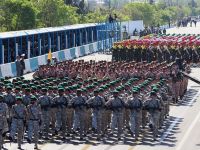One of the main opponents to the Jerusalem Light Rail Project (JLRP) project, are the Jewish settlers who reside in West Bank settlements around Jerusalem. The JLRP consists of initially one and in a later phase possibly multiple light rail lines to provide fast and efficient public transportation to and in Jerusalem.
The first line is currently under construction and scheduled for completion early in 2009. It will run from the settlements of Neve Yaakov and Pisgat Ze'ev in the northeast, then through Arab villages including Shoafat and south along Road 60 until Jaffa Street, from where it will follow Jaffa Street in a western direction to the Jerusalem Central Bus Station. Then it will continue to the southwest, crossing the Chords Bridge to the Beit HaKerem neighborhood. As mentioned earlier, JLRP is promoted as a "unifying project" as it meant to serve not only Jews but also end the isolation of the Palestinians in the Jerusalem area.
Experts believe that the tramway will offer numerous benefits for the residents of the Arab east Jerusalem. Exactly because of this assessment, Jewish settlers often criticize the logic behind this ambitious project.
Economic prosperity for Palestinians
Some settlers suggest that the new project will bring economic prosperity to the area on route of the train and thus will attract more Arab residents and businesses into the Jerusalem area. The settlers see this prediction with fear as it may block their attempt to juadize Jerusalem. Indeed, since 1967 and in particularly in the past decade Israeli governments stepped up measures to juadize the city. Among others, the Israeli policy, backed by the settlers, has also isolated east Jerusalem from the rest of the Palestinian cities in the West Bank.
Train will by-pass "Apartheid roads" for Jews only
For years, the Israeli government has been investing heavily in new settler-only bypass roads in the West Bank, including Jerusalem. These "Apartheid" roads are meant to block access to basic services in the face of the Palestinian residents of Jerusalem. This Apartheid policy was well described in former Israeli MP Shulamit Aloni's words: "By now they have requisitioned further lands for the purpose of constructing "Jewish only" roads. Wonderful roads, wide roads, well-paved roads, brightly lit at night--all that on stolen land. When a Palestinian drives on such a road, his vehicle is confiscated and he is sent on his way." Since the JLRT is meant to serve both Palestinians and Jews, the settlers are strongly objecting strongly to it.
In this context and based on settlers comments it is obvious that they will not use the train if Arabs residents are allowed to use it. Settlers believe it is "unacceptable" for them to sit in the same train along with Arab passengers.
Palestinians need the train; Settlers don't
In addition, the settlers fear the new train will be only for the benefit of the Arabs. Many of them reject the economic logic of the project and claim the use of the train by the settlers around Jerusalem will be marginal. According to them, the settlers will prefer using their fast and modern cars on the excellent roads leading from Pisgat Zeev and Neve Yaakov settlements into Jerusalem, instead of using the train. Thus, the train will be "left" for the Arabs, according to the settlers.
Beyond this, the settlers' objection for the train stems from religious reasons. The majority of Neve Yaakov settlers, for example, are strictly religious and thus maintain "theological claims" against the train. This means the settlers oppose the mixed seating of male and female in the same car of the train. For such an ultra-orthodox settlers to sit alongside a female is simply strict religious taboo.
It should be stressed that in many orthodox Jewish communities in Israel, especially in Jerusalem area, public transport buses operate regularly on the basis of what they call "modesty buses". The separation system is being applied on scores of public bus routes across Jerusalem streets. Due to the fact that the train will not offer segregation solutions for the ultra orthodox settlers, they oppose it altogether.
Train will upset the Judaizing of Jerusalem
However, if implemented according to plans, the light train project can jeopardize prospects for further Juadizing Jerusalem for several reasons. Firstly, the train is being built to stop at Palestinian villages and unlike the by-pass roads will be accessible for Palestinian passengers. Secondly, the original design of the Jerusalem light train project indicates that it is being built to create an easier link between residents of Occupied East Jerusalem and the center of the city. Thus, the train has the potential for serving not only the Jewish population. The key question at this point is if the Israeli government and other international parties will bow to the pressures exerted on them by settlers or stick to the original plans which offer some hope for the Arab Jerusalemites.







